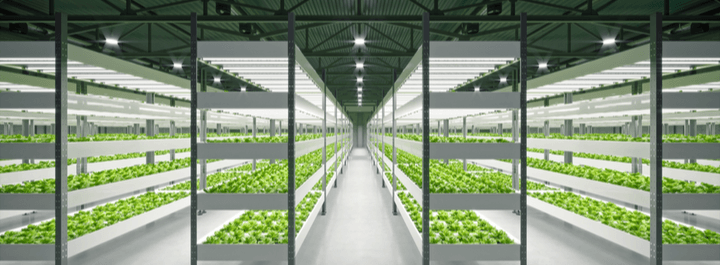
Commercial Hydroponics Farming in South Africa
Commercial hydroponics farming in South Africa, a ground-breaking concept has given farmers more control over the growth of their plants and crops. Nevertheless, the crux here is the role of Hydroponics in commercial farming in South Africa. Does hydroponics have a role to play or do we stick with all ways of mass producing food? This guide explores Commercial Hydroponics Farming in South Africa, its profitability and more.
What is Commercial Farming & Hydroponics Relevance?
Humans' resourcefulness, coupled with innovativeness led to the creation of hydroponics. Hydroponics offers several benefits that make it perfect for commercial farming. Although commercial farming comes in different forms, hydroponics is a versatile concept that can keep up with its demands. This quality makes it perfect for commercial agriculture. Commercial Farming is simply growing food for the purpose of sale. With commercial farming, food is grown to be sold rather than for personal consumption. Whether large scale or small scale, food is sold to a variety of customers. These customers may range from simple individuals and restaurants, to big stores and distributors.
Although organic farming have served many farmers for thousands of years, hydroponic farming is gaining popularity around the world, including South Africa.
Hydroponics uses liquid fertilizer and water, which is technically farming without soil. This method is becoming a favourite among commercial farmers in South Africa, as the cultivation method constantly improves. This farming system uses less land, so we understand its appeal to commercial farmers. Additionally, even though hydroponics is entirely water-based, it requires 90% less water than traditional methods. Most importantly, hydroponics implements a controlled environment that allows farmers to regulate pest control and weather inconsistencies.
Combining Hydroponics & Vertical Farming
As cities expand, urban hubs like South Africa can rely on hydroponics even with limited farm land. In urban areas, combining hydroponics and vertical farming results in higher yields and crop output in smaller spaces than organic farming. These factors imply you can start hydroponic farms in small rooms, such as backyards, bedrooms, rooftops, or even underground.
Most major commercial farming businesses and even small ones are taking advantage of hydroponics to grow crops and increase yields. An example is the 100,000 square foot indoor farm in the USA that yields about 5million pounds of greens every year. Commercial Hydroponic farming in South Africa has also made its mark on small scale farming by providing income for local farmers and feeding the population.
What are the benefits of commercial hydroponics farming in SA?
Over the years traditional farming has gotten a lot of bad rep because of massive erosion, large consumption of water and disease/pest borne illnesses. Commercial hydroponic farming in South Africa has built its strengths around these weaknesses, easing many of these concerns. They use less water, take up less space and can be regulated in a controlled climate.
There are several benefits of commercial hydroponic farming in South Africa as opposed to traditional farming. So, here are five benefits of commercial farming in SA you should know.
- Uses less Space
Plants need space to spread their roots in search for water and nutrients to ensure their survival. Therefore, they will require spacing from each other, which will in turn take up more land. Hydroponic systems don't need so much space because the roots do not need to spread out wide to ensure the plants' survival. Instead, water and nutrients are delivered to the plants. That way, it's possible to grow more plants in the same area as traditional based systems.
- Conserves water
According to research, field farms in the US account for 80% of its water use. That means we're using more water growing the crops than we do processing and eating them. Organic farming uses excess water because it evaporates, rolls off away, forms puddles, becomes unusable after a single use. Hydroponic systems use about 90% less water than traditional systems because water is delivered via a controlled method. Some hydroponic systems even reuse water, reducing water consumption drastically!
- Fewer Chemicals
Although pest issues are still a problem, the probability of it happening is lower, which results in lees need for herbicides and pesticides. Not only does it save money, but it means you don't have to worry about chemicals. Hydroponic methods of cultivation are meticulously regulated. So, the risk of weeds popping up are significantly reduced and since it is an indoor farm, pests are less likely to infiltrate.
- Better Growth
Studies show that plants in Hydroponics grow 30% to 50% faster than those grown in traditional systems. It is a result of the right amount of nutrients they receive and water needed to achieve proper growth. They are also not at the mercy of the elements and insects; therefore, they will grow faster.
- Nutrient Control
Hydroponic systems use a nutrient solution and water to grow crops. It gives the famer better control of the nutrients they have and you can add more nutrients as you wish.
If you are looking for quality kit and equipment to give you these advantages, check out Grow Guru for commercial hydroponic systems for sale.
How Much Does it Cost to Set Up a Hydroponics Farm?
Even though hydroponics do not use a lot of space, you still need a spot to get started. Hydroponic soilless farming in South Africa requires a greenhouse. You can either rent, purchase, or build a greenhouse, whichever tickles your fancy – or wallet. You should budget between $10,000 and a few hundred thousands, depending on the size of your space. Greenhouses can stand at several thousand square feet or a couple of hundred square feet. Nevertheless, the size of the facility is the primary factor to consider when calculating costs.
Commercial hydroponic growing systems generally require
- water solvent,
- seeds,
- grow tunnels,
- lighting,
- UV filtration,
- racks,
- nutrient reservoirs, etc.
So, you should budget a few thousand dollars for these supplies, which you can get at Grow Guru at the best prices.
Which Hydroponics System is Best for Commercial Use?
This question commonly comes next after you've figured how to start a commercial hydroponic farm. Well, the answer is, "it depends."
You might find that answer shallow and a little frustrating but let's explain. Commercial Hydroponic farming is used by everyone, from small scale tomato farmers to large scale food giants.
Every method has its flaws and weaknesses, which is why you must know the types of hydroponic systems first. You also have to take into account your budget, how much you can afford as a commercial farmer, which option will yield more produce at a lower cost and finally, your location.
Below are a few steps to decide what system best suits your commercial needs:
- What crops are you growing?
Let's say you want to grow tomatoes, then using a NFT system or even a DWC system will not yield any results and will be a waste. It is important to understand what your crops need and plan accordingly to help that crop produce bountifully.
- What's your budget?
It is important you take your budget into consideration when making your decision. And your budget should consider everything, not just the purchase of the system but little things like maintenance and operational costs of running such a system. Is it going to cost you more money to run than you can afford?
- Where are you farming?
There are different variables that affect the growth of a crop, from atmospheric pressure to temperature and as a farmer, it is your job to consider these factors and manage them to produce proper yields. Four of these factors (water, oxygen, nutrients and temperature), can be directly influenced by Hydroponic growing systems and your geographic location will influence those variables.
- Plan out your maintenance
Like every system, Hydroponics break down, get clogged and even need complete replacement. These systems need to be fixed and it's up to you decide what system is best for the type of crop you are planting. Plan out how to access the vulnerable parts of the hydroponics and if you will be functional for the crop type you intend to plant. Take into account the cost of replacements, and how easily available they are if there's need for replacement. Explore the Grow Guru store for commercial hydroponic systems for sale. Once you have made your decision, you can also purchase a hydroponic farming at home kit.
Grow Guru is an online platform that caters to your hydroponic needs. They supply kits and also provide advice to its customers on how to start Hydroponic farming and efficiently yield results at reasonable costs. Oftentimes, we encounter a stumbling block on our path of hydroponic farming and Grow Guru is there to offer a helping hand with explanatory guides and consultation.
They offer premium service to home growers and teach you how to effectively grow cannabis and more.
Is the Hydroponics Business Profitable?
Due to environmental factors and technology development, hydroponic farming in South Africa is increasingly popular. Its widespread use has created awareness of the technology, thereby improving profits and attracting investors.
Furthermore, this technique is affordable and has minimal risks, which makes it ideal for commercial use. Over the years, growing plants and crops hydroponically have proven to be quite profitable.
Profits from commercial hydroponic farming in South Africa are enough to pay for overhead expenses. Some even provide reasonable wages for farmworkers if done right. An acre of farmland can reportedly yield an average of $230,000 and $270,000 annually compared to traditional farming that yields between $25,000 and $35,000 per annum.
Conclusion
Commercial Hydroponics Farming in South Africa has grown over the years and is currently dominating the agricultural sector. Hydroponic farming in South Africa has proven to farmers and investors alike that it is capable of producing more than its market value while maintaining minimal risks.
In this guide, we discussed the relevance of Hydroponics to commercial farming vs organic farming, the cost of starting a hydroponic business, and the potential profits of a Hydroponic farm business. If you intend to dabble in hydroponic commercial farming, we hope this guide serves you well and be sure to vist Grow Guru for any supplies you may need.

Leave a comment